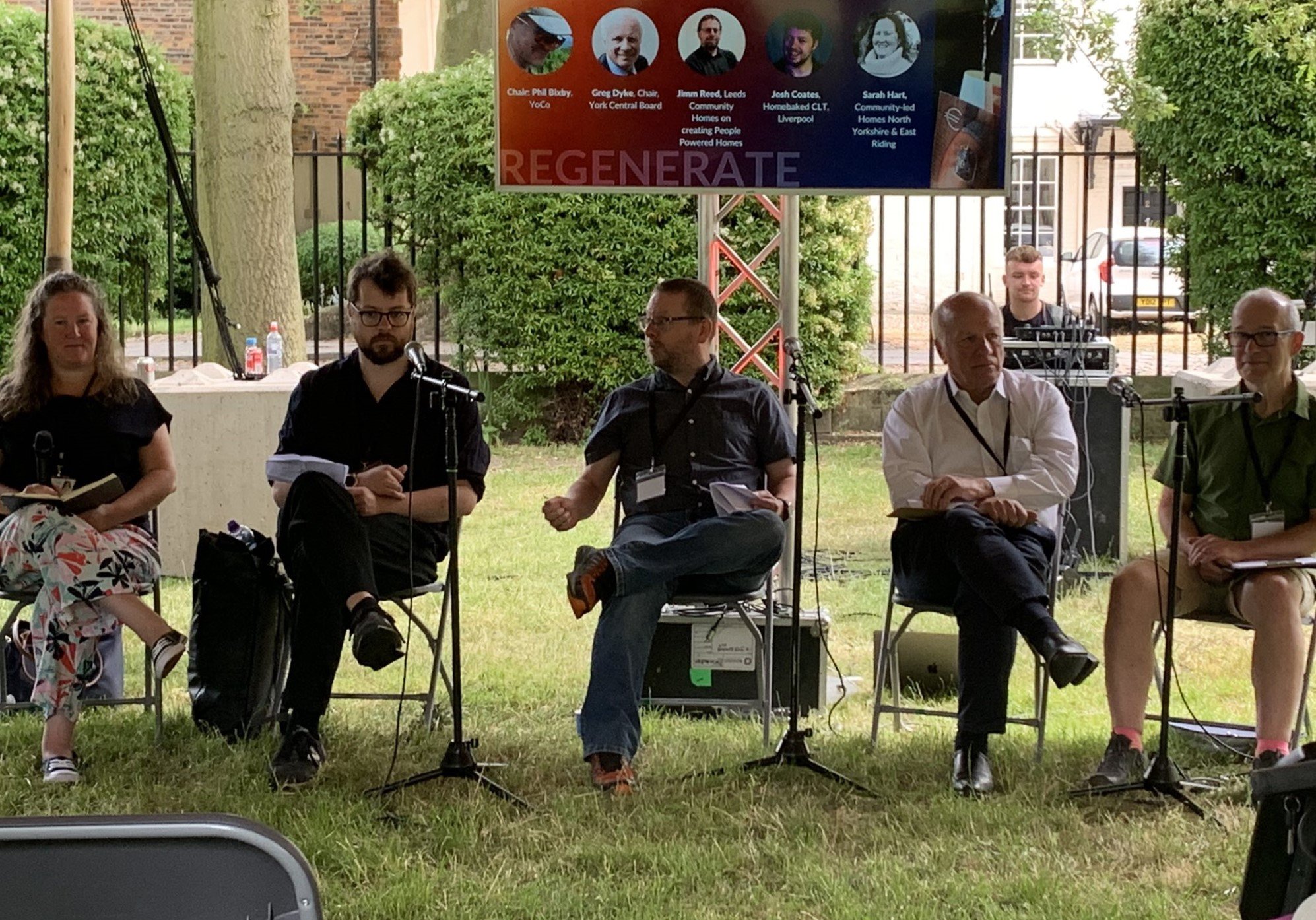Big Tent Day 2: ‘How communities can shape their own future – Lessons for York Central’
The panel in action. Credit: Big Tent
YoCo was involved in two sessions as part of the Radix Big Tent. In this blog we discuss the the session we convened on Saturday – you can read about the Friday session here.
This session was facilitated by Phil Bixby on behalf of York and included as speakers:
· Greg Dyke, Chair, York Central Strategic Board
· Jimm Reed, Leeds Community Homes
· Josh Coates, Homebaked
· Sarah Hart from Community-led Homes North Yorkshire & East Riding
Phil opened the session with the following introduction and framing:
Exploring the ambition of community groups and learning from successful projects how communities can shape neighbourhoods and economies through participation.
I’m an architect with a background of working on sustainable and community projects. Some years back I started working with heritage academic Helen Graham on developing better approaches to community engagement in response to the difficulties we seem to have in York around thinking positively about the future. We ran large-scale public engagement projects for the Castle Gateway area and for York Central. The latter of these two led to a bold public vision for the development of this huge brownfield site, and then to the formation of YoCo – York Central Co-Owned – as a community group working to develop that vision into a mature plan which considered local economy and governance in addition to sustainable buildings and places.
Work with YoCo – and especially contact with other community projects with bold visions such as Coin Street on London’s south Bank, and Mayday Saxonvale in Frome, have brought into focus the challenge these initiatives have.
There is a power dynamic at play on most big development projects where community-led stuff is seen as “good” as long as it’s limited in scope and doesn’t challenge the bigger aims of the main development players and their economic agenda.
There’s a danger that community-led projects become safety-valves in top-down redevelopments – taking on a garden or a derelict shop, and becoming initiatives proudly promoted as “working with the community” by big developers and public bodies alike.
But what happens where a community wants to be more bold – shaping a whole neighbourhood and claiming greater agency through the power of participation?
We have a panel today which should bring out some interesting perspectives on this. We have:-
· Greg Dyke, whose role as chair of York Central Strategy Board gives him a position to explore how the development process here meets the needs and ambitions of the city.
· Jimm Reed, whose years working in community-led housing with Leeds Community Homes have been ones of negotiating opportunity and challenge, with the big aim of creating a People Powered Homes revolution
· Josh Coates, whose life and work is very much intertwined with Homebaked Community Land Trust in Anfield, Liverpool – a fabulous project which began with the daring rescue of a corner-shop bakery and has grown to include creating space for businesses and affordable homes, and the transformation of a neighbourhood.
· Sarah Hart, whose position running the regional Community-Led Homes Hub, has given her a clear view of how policy and funding has shaped ambition and action at grass-roots level.
Given our focus on York Central I’m going to ask Greg Dyke to start us off with his take on what will make it a long-term success, and I think the stories our speakers will tell will then give us a really helpful starting point in exploring how the community can shape that future.
Greg Dyke, Chair, York Central Strategic Board
Greg opened by asking: ‘what the priorities of the incoming master developer should be?’
Greg suggest the priorities should be:
1) Homes – we need greater affordable housing than the 20% in the outline planning consent. We need to avoid Air BnBs.
2) Architecture - needs to be beautiful and imaginative.
3) High Waged Jobs – these could be created via the government hub, the Network Rail region hub, but Greg argued there should not just be public sector jobs on York Central. There should also be affordable space for start ups, encourage the growth of new industries (like the incubator and maker space YoCo is developing for the Foundry Buildings)
4) Building Communities - we need a mixed community, becoming a vibrant community in itself, not a desolate business district which is dead at night.
5) Culture - the National Railway Museum is important but not the only culture and heritage on the site
6) Communities and Money need to work together and to understand each other - this could create a brilliant #YorkCentral.
Jimm Reed, Leeds Community Homes
Often land is the big difficulty for communities seeking to develop community homes. First barrier is to overcome reputation risk to public agencies, communities need to show credibility and deliverability.
Jimm talked through LILAC and Chaco in Leeds, reflecting on the need to be an 'amicable activism', a 'loud irritant', 'annoying enough they want to bring you into the tent', but not so annoying they dismiss you. There is an 'art to that and it will be different in each situation'.
Jimm argued that these projects should be easier to do. The problem for the sector is that we are not capitalized. The purpose of Leeds Community Homes is to build a track record and develop a capitalised asset base so that every project does not need to start from the beginning in terms of financing and reputation; this includes building and owning homes as a community landlord, and launching community share offers to enable investment from ordinary people to finance projects.
Josh Coates, Homebaked
Josh shared the history of Homebaked in Anfield in Liverpool. A community-owned bakery and now creating a high street scheme through developing a run of Edwardian terraces, creating eight homes, retrofitting high energy efficiency standards and all at affordable rent. Soon Homebaked will be running a community share issue to enable the scheme to develop.
Sarah Hart from Community-led Homes North Yorkshire & East Riding
Sarah opened up by exploring economic models. One strand is equity from the people who want to live in the homes to enable cross-subsidy. Sarah advocates Chaco in Leeds and suggests that model - with people bringing in equity, Mixed Uses and Cross Subsidy - could be supersized for YoCo on York Central.
Sarah noted that there are not many lenders for community housing at the moment. There is a national move to talk to other lenders and increase the range of financing for community housing.
Sarah advocated a collaborative approach that is in everyone’s interests: ‘We need to work with all key stakeholders but the key is to ensure communities are enabled and play a defining role – turning NIMBY’s into YIMBY’s - and working through an economic model that works for everyone. Part of this is developing a shared language’.
Questions:
The first question was about sustainability. Greg argued sustainability should be a given on York Central. Jimm noted the financial challenge of building to very high standards but also the importance of aiming high. Jimm and Sarah both added that for communities developing homes high standards and low running costs is a top priority.
Phil added that adds that sustainability on York Central is not just about passive standards but also about wider issues relate to car use and economic activity. This is why YoCo is focused on 15 min mix use neighbourhoods.
The second question is about accessible housing and life time homes. Jimm talked about Leeds Community Homes involvement in new builds that responded to their disabled members’ needs. Jimm points to the bigger issue of existing housing stock that is not accessible.
A contribution from the floor made the point that Lifetime Homes (and Building Regs Part M) standards are minimum standards and if you have a slightly wider wheelchair then Lifetime Home Standards are not sufficient.
A third question was asked about how to build in ongoing innovation and change into York Central given it has a 20-30 year build out. Greg said that this has to be the case, 'the only thing you know about a 30 year strategy document is that it is wrong'.
Final thoughts from the panel:
The session concluded with a final round of comments from the panel - advice for the master developer who is about to be appointed.
Sarah talked of taking up Living Labs ideas to experiment and pilot ideas. Josh challenged the idea of traditional 'come to us/have your say' consultation. Instead having a chat is important, we should be equally interested in people lives as we expect them to be interested in what want to do. Jimm suggested that developers shouldn't fear communities but embrace them. Greg argued that York Central should be done with and by the people of York rather than done to the people of York. ‘Don't work from the assumption that communities are just agit prop, explain the financial issues and work with them’.

